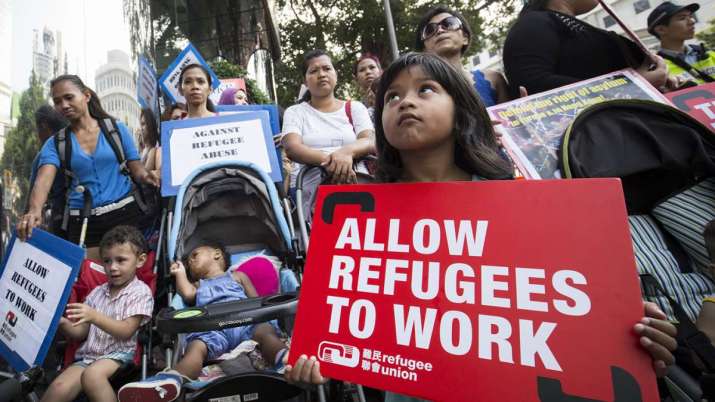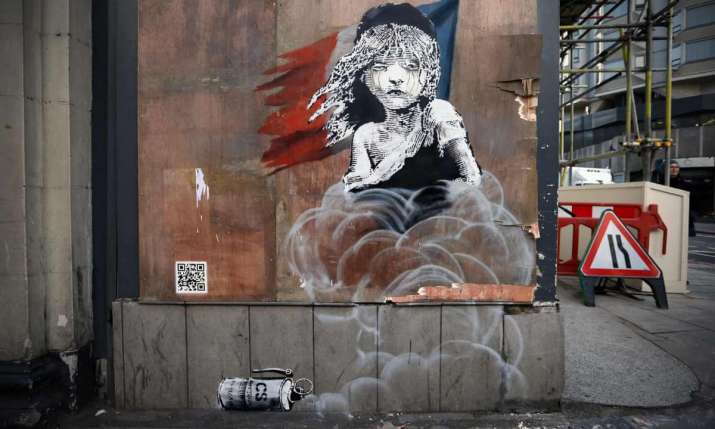FEATURES|THEMES|Commentary
Buddhistdoor View: We Are All Seeking Refuge
 Refugees in Hong Kong seek the right to work. From vfnow.org
Refugees in Hong Kong seek the right to work. From vfnow.orgAccording to the United Nation’s 1951 Geneva Convention, a refugee is a person who flees their country of origin and cannot return due to a fear of being persecuted for their race, religion, nationality, social group, or political opinion. Later conventions, including the 1984 Cartagena Convention, expanded the definition for who should be offered international protections to reflect changing geopolitical needs.
No one chooses to be a refugee, to be torn away from one’s home, community, livelihood, friends, and family. The condition of the refugee is one of perpetual uncertainty and insecurity. It is, in a sense, the same dukkha that is part and parcel of the human condition, but amplified to levels few of us will ever experience. Indeed, Buddhist scholar and Zen teacher Ruben L. F. Habito gave a 2017 Dharma talk titled “We Are All Refugees: Seeking our True Home.” (Tricycle)
Reflecting on this, we might recognize ourselves in the eyes and hearts of refugees seeking our help in the world today. As verses in the Dhammapada instruct us:
Everyone trembles at the stick, everyone fears death,
comparing oneself with others, one should not hurt or cause harm.
Everyone trembles at the stick, for all beings life is dear,
comparing oneself with others, one should not hurt or cause harm. (Chapter 10)
In this world of samsara, we are all in fear, we are all seeking refuge. In the abstract this is easy to recognize and accept. But in our lives as individuals and in society, how often does this truth arise when we encounter a person plainly suffering before us? In the case of refugees, our record as a species has been rather poor. Virtually everywhere that refugees have sought help, they have been hidden, often in the most terrible of conditions, so that the day-to-day business and lives of the rest of society could continue unimpeded.
The instances of this are many: the infamous Calais Jungle in France, where thousands of migrants from the Middle East and Africa languished as they sought stable homes and lives in Europe, or the asylum seekers in Australia stuck in a bureaucratic and unwelcoming system, or the cement-floored cages used to house many of those seeking a new life in the United States. Indeed, some of the best-known Buddhists today were themselves refugees, or have had to flee home at some point in their lives, fearing persecution.
 The Les Misérables artwork by street artist and political activist Banksy opposite the French embassy in London criticizes the use of tear gas to clear the Calais refugee camp in 2016. From theguardian.com
The Les Misérables artwork by street artist and political activist Banksy opposite the French embassy in London criticizes the use of tear gas to clear the Calais refugee camp in 2016. From theguardian.comIn Hong Kong, too, refugees have been relegated to slum-like conditions out of sight of the average citizen. In an open letter to the Hong Kong people, one refugee reminds us that, “First of all, refugees are also human beings. Whatever situation we are escaping—and I won’t judge others—we are not talking about some animals, but people like you. Today we need international help, tomorrow it could be you. Readers should remember that refugees are not dangerous per se, but governments put refugees in dangerous situations.” (Vision First)
At the height of the recent refugee crisis in Europe, members of the European Buddhist Union issued a statement calling for a compassionate response. In part, they said, “As Buddhists of many traditions and countries in Europe, we hold loving-kindness, compassion, generosity, and fearlessness to be among the highest values in life; values we share with those of other religions and none. Seeing our fundamental interconnectedness with all beings, we recognise the ‘refugees,’ ‘migrants,’ and ‘asylum-seekers’ now streaming into Europe as people like ourselves, desperately seeking relief from suffering and longing for happiness.” (The Buddhist Centre)
Interconnectedness is a core Buddhist idea and one that lends itself easily to an issue like refugee treatment. One can know interconnectedness in simple terms of non-self, wherein “I” have no permanent core and thus am fundamentally connected to you, and you to me, or in more complex imagary, such as Indra’s net of the Avatamsaka Sutra, wherein every jewel reflects (and in this sense contains) every other jewel in the universe. In Tibetan Buddhism the practice of tonglen, literally “giving and taking,” involves imaginatively taking on the pain of others and giving happiness. And Thich Nhat Hanh famously coined the term “Interbeing,” which would become the English name for his monastic order, to emphasize the completeness of our interconnectedness in our very beings.
Our connection to refugees is inescapable, and our attempts to ignore them or hide them away—or worse, to meet them with violence—are manifestations of our own greed, aversion, and fundamental delusion. As Buddhists, our core values of wisdom and compassion must propel us to not merely see and acknowledge the suffering of refugees, both near and far, but also to offer solutions based on our capacities as individuals, communities, and societies.
In cultivating our own morality, we can seek ways to offer direct help to refugees. And in democratic societies, we can envision government programs that ensure that their dignity as fellow sentient beings is recognized through this difficult time in their lives. This is little more than we would hope for if we were in a similar situation.
We can also recognize that karma is a universal law. Our turning away from these people plants seeds in our karmic continuum that could ripen in many ways, but possibly in help being denied to us in our own time of need. On the other hand, by helping refugees, we foster a mental habit of giving and kindness that will ripen into greater joy and freedom in our own lives.
Given the many crises in the world today and the likelihood that climate change will create yet-unknown waves of refugees around the world (and remembering that these could include ourselves), it would be wise for us to consider and adopt robust policies and practices for the Buddhist treatment of refugees. Listening deeply to refugees, we hear that they are no different from us, simply caught up in terrible circumstances beyond their control. Drawing from core principles found across Buddhist traditions, we can offer a path that can be followed by individuals, NGOs, and politicians that reflects care for both refugees and society as a whole.
See more
We Are All Refugees: Seeking Our True Home (Tricycle)
Asylum seekers left ‘desperate’ and ‘helpless’ when they try to find work in Australia (The Conversation)
Open Letter To HK People: Selfishness Blocks HK From Welcoming Refugees (Vision First)
European Buddhist Union calls for compassion for refugees (The Buddhist Centre)
Related features from Buddhistdoor Global
Living Dr. Ambedkar’s Vision
The Way of the Bodhisattvas
Buddhistdoor View: Climate Change is a Profound Moral Concern for Buddhists
Buddhistdoor View: Shelter for the Weary and Dispossessed amid the Refugee Crisis
The Plight of Buddhist Minorities in Bangladesh
Related news from Buddhistdoor Global
Dalai Lama’s Statements about Women and Refugees Lead to Outcry and an Apology
Korean Buddhist Humanitarian Organization JTS Brings 100,000 Gas Stoves to Rohingya Refugees in Bangladesh
Myanmar Buddhists Protest Against Repatriation of Rohingya Refugees
US Buddhists Protest Donald Trump’s Travel Ban on Seven Muslim-majority Countries














